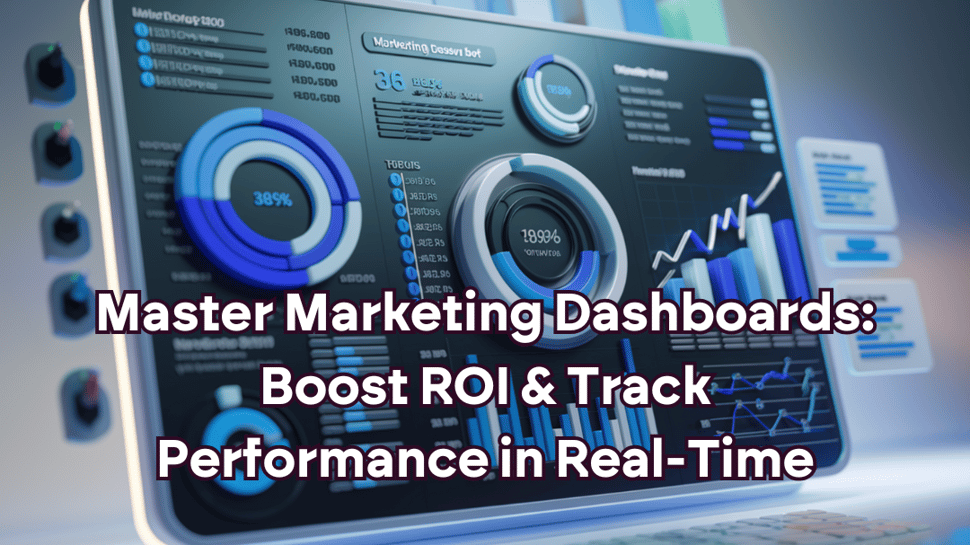
Blog Details
Master Marketing Dashboards: Boost ROI & Track Performance in Real-Time
- January 6 2025
- Nikias Kray

In today’s fast-paced digital landscape, marketing dashboards have become indispensable tools for businesses aiming to streamline their strategies, measure performance, and drive revenue growth. This guide will explore the different types of marketing dashboards, their benefits, and how to use them effectively to optimize your marketing efforts.
What Are Marketing Dashboards?
Marketing dashboards are visual tools that consolidate and present key marketing metrics in a single, easy-to-understand interface. They provide a real-time overview of your marketing activities, allowing teams to track performance, identify trends, and make informed decisions.
Why Marketing Dashboards Are Essential for Your Business
-
Centralized Data: Combine data from multiple sources like email campaigns, social media platforms, and website analytics.
-
Improved Decision-Making: Quickly identify what’s working and what needs adjustment.
-
Enhanced Collaboration: Share insights across teams to align goals and strategies.

Types of Marketing Dashboards
1. Marketing Activity Dashboard
This dashboard helps monitor all marketing activities, including:
-
Email Marketing: Track open rates, click-through rates (CTR), and conversion rates.
-
Social Media Performance: Measure engagement metrics like likes, shares, and comments across platforms.
-
Website Analytics: Monitor traffic sources, page views, and bounce rates.
2. Marketing Performance Dashboard
Focus on assessing the effectiveness of your campaigns and their impact on revenue:
-
Lead Generation Metrics: Understand how many leads are being generated through specific channels.
-
Lead Nurturing: Track how leads progress through the sales funnel.
-
Revenue Impact: Measure marketing’s contribution to overall business revenue.
3. Campaign Effectiveness Dashboard
Evaluate the success of individual marketing campaigns:
-
Return on Investment (ROI): Calculate the ROI for each campaign.
-
Customer Acquisition Cost (CAC): Assess the cost-effectiveness of your campaigns.
-
Engagement Metrics: Dive into detailed performance insights for specific campaigns.
How to Create an Effective Marketing Dashboard
Step 1: Identify Your Objectives
Start by defining the specific goals you aim to achieve with your marketing dashboard. Clear objectives will guide the design and functionality of the dashboard. Examples include:
-
Improving Lead Generation: Focus on increasing the number of qualified leads entering your funnel.
-
Enhancing Brand Awareness: Track metrics that reflect your brand’s visibility and engagement.
-
Boosting ROI: Concentrate on identifying the most cost-effective marketing strategies.
-
Streamlining Campaign Analysis: Enable faster and more precise evaluations of campaign performance.
Step 2: Select Key Metrics
Choose metrics that align closely with your objectives. By focusing on the right data points, you can avoid overwhelming your dashboard with unnecessary information. Key metrics might include:
-
Traffic Sources: Determine where your visitors are coming from.
-
Conversion Rates: Measure how effectively your campaigns turn visitors into leads or customers.
-
Cost Per Lead: Evaluate the efficiency of your lead generation efforts.
-
Customer Lifetime Value (CLV): Assess the long-term value each customer brings to your business.
-
Engagement Metrics: Monitor interactions such as clicks, shares, and time spent on pages.
Step 3: Choose the Right Tools
Selecting the right tools is critical to creating an effective marketing dashboard. Look for platforms that integrate with your existing marketing tools and offer real-time data updates. Popular options include:
-
Google Analytics: Ideal for tracking website performance and traffic sources.
-
HubSpot: Comprehensive solution for managing and analyzing marketing campaigns.
-
Tableau: Advanced visualization tool for detailed insights.
-
Power BI: Robust business intelligence platform for large datasets.
-
Custom Solutions: Consider developing custom dashboards tailored to your specific needs.
Step 4: Customize for Your Audience
Not all stakeholders require the same level of detail. Customize the design and data presentation of your dashboard based on who will use it:
-
Executives: Provide high-level summaries that highlight overall performance, key trends, and ROI.
-
Marketing Teams: Include granular data such as channel-specific metrics, campaign breakdowns, and real-time updates.
-
Sales Teams: Focus on metrics that showcase lead quality, pipeline progress, and opportunities for collaboration.
Customization ensures that the dashboard remains relevant and actionable for each audience, increasing its effectiveness as a decision-making tool.
Best Practices for Using Marketing Dashboards
-
Automate Data Updates: Use tools that provide real-time data updates to avoid manual errors.
-
Set Benchmarks: Compare current performance against industry standards or historical data.
-
Keep It Simple: Avoid clutter by focusing on essential metrics.
Benefits of Marketing Dashboards
-
Increased Efficiency: Save time by eliminating the need to compile data manually.
-
Better Insights: Gain actionable insights to refine your marketing strategies.
-
Scalability: Easily adapt dashboards as your business grows.
Conclusion
Marketing dashboards are powerful tools for driving growth and achieving marketing excellence. By centralizing data, measuring performance, and enabling data-driven decisions, they empower businesses to stay ahead of the competition. Whether you’re monitoring marketing activities, assessing performance, or evaluating campaign effectiveness, a well-designed marketing dashboard is key to success.
Ready to transform your marketing strategy? Explore the possibilities with CRM Magnetics and discover how our solutions can help you create impactful marketing dashboards that drive results.
-
Reporting & Analytics
Data management
Reporting dashboards
CRM Magnetics
Marketing Dashboards
Marketing Activity Dashboard
Marketing Performance Dashboard
Campaign Effectiveness Dashboard
Marketing Analytics Tools
Real-Time Marketing Insights
Marketing Data Visualization
Lead Generation Metrics
Boost ROI
Optimize Marketing Strategies
Reporting


Leave your thought here
Your email address will not be published. Required fields are marked *